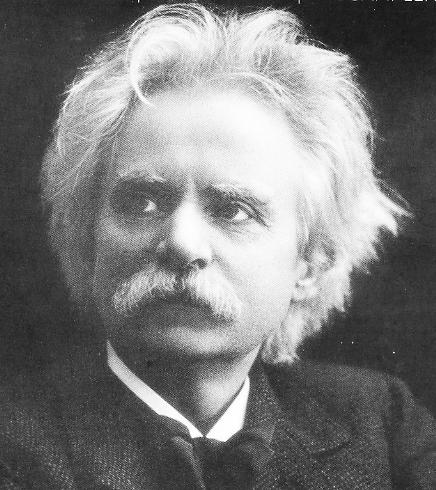In an odd way, this post is a bit of a culmination of quite a few posts that I have made over the past month or so. First off, it's another case of a multi-movement piece of music having more than one movement become wildly popular. Second off, it's another case of incidental theatre music far outstripping the play itself in terms of being well-known. And thirdly, the second piece illustrates a freaking sunrise. Not a bad way to cap off a month of blogging, I'd say. The piece, incidentally (I'm going to get so much grie
 |
| Grieg, age fifteen, wearing a wig and false mustache to appear older. |
In 1874, Henrik Ibsen asked Grieg to write incidental music (for those who have forgotten or who have not been following this blog since its inception - and shame on you for that - incidental music is music written for a play that is not necessary for the plot's development) for his play in verse Peer Gynt, and Peer Gynt was premiered in February of 1876. Though the play itself is performed quite often in Norway, its extraordinary length has kept it from being part of the theatrical canon pretty much anywhere else. Besides which, as seems to be the case for much 'incidental' music, the music itself has gone on to wild international popularity.
The character Peer Gynt is a young man of rather disreputable character, often getting drunk and having to quickly leave messy situations he has created. Booze is a central factor in many of Gynt's misadventures, be it stumbling into a wedding to try and wrest the girl he loves from her husband-to-be or, y'know, hitting his head on a rock and dreaming up an entire civilization of trolls.
 |
| What I sincerely hope Gynt saw. Thanks, Harpsterdraws! |
"Morning Mood," or "That piece in every single morning scene in Looney Tunes," is the prelude to Act IV. Also Sprach Zarathustra's more timid cousin, "Morning Mood" also tries (and succeeds, in my estimations) to paint a sunrise with music. Though it is decidedly less epic and more pastoral than Zarathustra, sometimes that's just what is needed - particularly when milkmaids are concerned.
A small addendum: Peer Gynt also includes, much in the vein of Aaron Copland, a piece of fiddle music he couldn't seem to put down. First he turned it into a solo piano piece:
Then he added it smack dab into the middle of the opening of Peer Gynt (skip to 1:50 to hear it):
Sometimes it's best to know when to put a good thing down, yes, but it's equally good to know when to milk it for all it's worth.
Further Listening:
Like Grieg, and also heartbreaking works of staggering beauty? Try "Solveig's Song" from Peer Gynt, performed by Anna Netrebko: http://www.youtube.com/watch?v=2AZL0FcQDV0&feature=related
Like Grieg, and also piano concertos? Guess what this is going to be, then: http://www.youtube.com/watch?v=9ypR4VKi1TM&feature=related
Ravel's Lever du Jour from Daphnis et Chloe also sounds exactly like a sunrise. Chirping birds and everything.
ReplyDelete